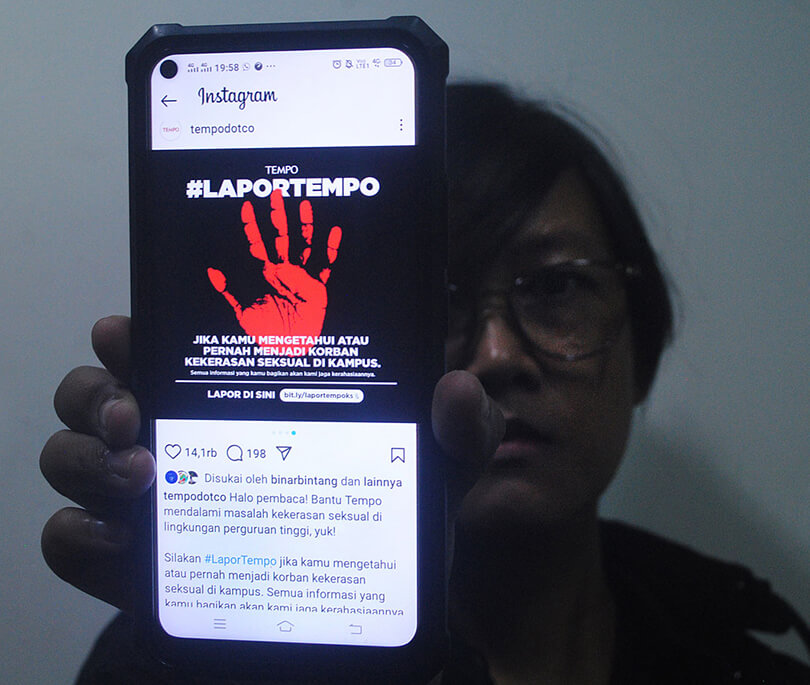
Photo: Joa Souza via Getty Images
Breaking the silence on sexual harassment in Indonesia
Indonesian university professors have been sacked and suspended for sexually harassing students after an IMS media partner put the spotlight on campus sexual violence.
For years, survivors of sexual harassment on Indonesian university campuses suffered in silence amid cover ups and inadequate investigations protecting perpetrators.
Experts say the global #MeToo movement was slow to gain ground in Indonesia – a conservative society with a strong patriarchal culture – a hangover from 32 years of authoritarian rule which ended in 1998.
Tempo, an Indonesian media organisation well known for its investigative journalism, set up a special app empowering survivors to share their experiences with journalists.
The app, called “Lapor Tempo” (Report to Tempo), was part of Tempo’s foray into constructive journalism – solutions-focused reporting – and a push for greater public participation in reporting processes. The app was designed to give whistleblower protection to survivors to ensure their safety.
In the two months since its launch, Lapor Tempo received 52 tips spanning 35 universities. The app empowered survivors to tell their stories, seek justice and heal.
“I didn’t talk about it. I kept it inside, but I felt depressed,” one Indonesian university student told Tempo.
More than half of the complainants were dissatisfied with the way their cases were being handled by authorities. Allegations ranged from catcalling and inappropriate behaviour from lecturers to a forced abortion.

Tempo’s subsequent reporting scrutinised police and university responses to victims’ reports:
— A student from Islamic University Riau was sexually assaulted by a senior lecturer. Tempo reported on the inadequate police investigation by local officers and the students’ efforts to escalate the case to national police.
— Universitas Gadjah Mada in Yogyakarta fired a lecturer after dozens of students made abuse allegations. The university had previously tried to cover up the incidents. Tempo reported that survivors have appealed to Higher Education officials in Indonesia to remove the perpetrator’s civil servant status, a move which would stop him from teaching elsewhere.
— Universitas Pembangunan Nasional “Veteran” in Yogyakarta suspended a lecturer for two years and ordered him to pay compensation to a student who claimed he abused her when she visited his office to inquire about her studies. Tempo reported the student was yet to receive any money and had not had her
counselling costs reimbursed but campus officials were handling the case.
Indonesia’s National Commission on Violence Against Women conducted a survey in 2024 and found 1,133 cases of sexual violence on campus.
IMS provided financial support and training to Tempo for its constructive journalism stories.
Tempo’s reporting went beyond framing campus sexual violence as a problem. Its coverage was also solutions focused, looking at examples of universities that were taking appropriate action.
It reported on how Hasanuddin University in Sulawesi responded. The university’s sexual violence and prevention taskforce suspended a perpetrator for three semesters. The taskforce, headed by a law professor, conducted a thorough investigation and looked for evidence, obtaining video surveillance of the alleged incident. Tempo suggested universities without legal faculties should collaborate with local legal aid organisations.
Hotline for journalists
Another IMS partner, Aliansi Jurnalis Independen, a journalists’ organisation that fights for press freedom, launched a whistleblower hotline where journalists experiencing sexual harassment or abuse could make complaints.
The alliance put together an educational cartoon video raising awareness about what constitutes inappropriate behaviour and how reporters can confidentially report cases and access support and counselling.
After receiving support from 12 organisations, including legal aid and counselling services, the alliance was able to expand the hotline beyond its members to all journalists, including student reporters and citizen journalists.
IMS worked with the alliance on developing the hotline and whistleblower platform according to international standards. It also provided financial support and mentoring.




